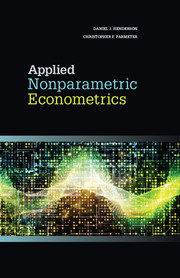Book contents
- Frontmatter
- Dedication
- Contents
- 1 Introduction
- 2 Univariate density estimation
- 3 Multivariate density estimation
- 4 Inference about the density
- 5 Regression
- 6 Testing in regression
- 7 Smoothing discrete variables
- 8 Regression with discrete covariates
- 9 Semiparametric methods
- 10 Instrumental variables
- 11 Panel data
- 12 Constrained estimation and inference
- Bibliography
- Index
6 - Testing in regression
Published online by Cambridge University Press: 05 February 2015
- Frontmatter
- Dedication
- Contents
- 1 Introduction
- 2 Univariate density estimation
- 3 Multivariate density estimation
- 4 Inference about the density
- 5 Regression
- 6 Testing in regression
- 7 Smoothing discrete variables
- 8 Regression with discrete covariates
- 9 Semiparametric methods
- 10 Instrumental variables
- 11 Panel data
- 12 Constrained estimation and inference
- Bibliography
- Index
Summary
In regression, estimation is only one component of an empirical analysis. It is incumbent upon the researcher to conduct inference regarding various features underlying the unknown data generating process. The story is no different for nonparametric methods. Many of the tests discussed in this chapter will be analogous to tests performed with parametric estimators. The tests here are similar to those in Chapter 4 and we suggest that you familiarize yourself with the fundamentals discussed in that section before proceeding further if you have not done so already.
As with inference in the density setting, the use of nonparametric testing facilities offers the opportunity to deploy consistent tests. Our main discussion here will be on goodness-of-fit and nonparametric conditional-moment tests. While there are numerous testing approaches, conditional-moment tests serve the same purpose here as the ISE-based tests in Chapter 4. Conditional-moment tests have a rich history in applied econometrics and they are sufficiently general to offer tests for an array of important hypotheses within the regression framework.
Our discussion sets out with perhaps the most common nonparametric regression testing problem, that of correct functional form specification. Recall that a correctly specified parametric regression model will always produce more efficient estimates of the unknown model parameters than a nonparametric model will. Thus, testing the functional form of an empirical model is important for applied econometric research. Another popular inferential concern in the regression context is that of variable significance (either individual or joint). This type of inference can also be supported with the conditional-moment tests discussed here. Finally, we show how a test for heteroskedasticity of the error term can also be cast as a conditional-moment test. Testing for heteroskedasticity is important because knowledge of the presence of it may be used to construct more efficient nonparametric estimators.
Implementation of these tests faces similar hurdles that our ISE tests in Chapter 4 encountered, namely, issues related to appropriate selection of the bandwidths to be used when constructing the test statistic, as well as the choice between using the limiting distribution versus a bootstrap approximation.
- Type
- Chapter
- Information
- Applied Nonparametric Econometrics , pp. 159 - 186Publisher: Cambridge University PressPrint publication year: 2015



